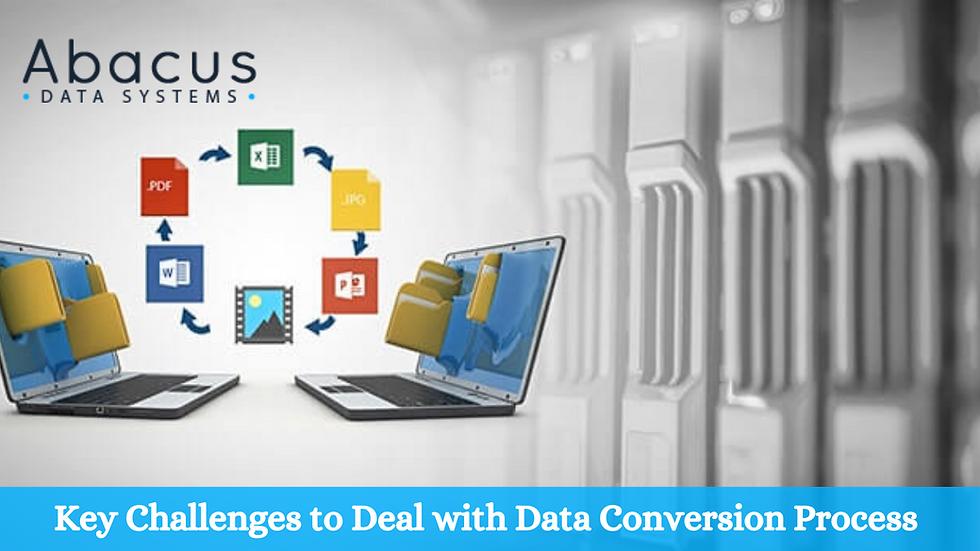Key Challenges to Deal with Data Conversion Process
- Abacus Data
- Nov 18, 2023
- 3 min read

In today's digital age data conversion has become very essential. It is a common task for migrating, analyzing, and sharing data.
Firstly, let us understand what data conversion is?
Data conversion refers to transforming data from one format or structure to another, to make it compatible with various systems, applications, or platforms. Data conversion services follow a series of technical practices for ensuring the seamless adaptation and integration of data in the rapidly evolving digital world.
What Are the Three Types of Data Conversion?
The possible types of data conversion are standard conversion, no conversion, and user-defined nonstandard conversion.
1. Standard Conversion:
This type of data conversion involves converting data from one standard format to another standard format. Standard formats are commonly accepted and widely used formats that follow specific rules and guidelines.. Standard conversion is typically straightforward and can be done using built-in functions or methods in programming languages.
2. No Conversion:
No conversion, as the name suggests, means that there is no need to perform any conversion on the data. This can occur when the source and target data formats are already compatible or when they both follow the same standard format
3. User-Defined Non-Standard Conversion:
This type of conversion involves custom or specialized conversions that are specific to a particular use case or system. It is used when the source and target data formats do not match any standard formats or when additional transformations beyond standard conversion are needed. It may require writing custom code or using data transformation tools.
While data conversion is a crucial step in the process of integrating, upgrading, or migrating systems, it comes with its own set of challenges.
Challenges with Data Conversion
Errors in data conversion aren't just hiccups—they're potential threats for massive losses. As organizations lead the path of digital transformation, understanding and addressing challenges in data conversion become crucial for maintaining accuracy. Let's unravel the essence of these challenges and explore simplified strategies to navigate them successfully.
Data Compatibility:
One of the main challenges in data conversion is ensuring compatibility between different systems, databases, or file formats. Each system may have its own data structure, format, and rules, making it difficult to seamlessly transfer data between them. Let's say you have Microsoft SQL server-based data and you want to create Oracle-based data then it would be difficult to do so. The difference between their data structure and system requirements will pose a big challenge.
To overcome this challenge, data conversion company often use data integration tools or ETL (Extract, Transform, Load) processes. These tools can help convert data between different systems by extracting data from the source system, transforming it into a compatible format, and then loading it into the target system.
Data Integrity:
Maintaining data integrity during the conversion process is crucial. It ensures that data remains accurate, consistent, and valid throughout its entire lifecycle, including during the conversion process from one format or system to another. Even small errors or omissions can lead to significant consequences.
Data Loss:
During the conversion process, there is always a risk of data loss. This can occur due to human errors, technical issues, or even compatibility problems between the source and target systems. It is essential to have robust backup mechanisms, implement data recovery procedures, and perform regular testing to minimize the impact of data loss.
Data Mapping:
Data mapping is the process of transforming data from one format or structure to another. It helps in connecting different sets of data and determining how information from one source corresponds to the other. It also involves both the extraction of data from the source system and the transformation of that data to fit the structure and requirements of the target system.
Mapping data can be complex, particularly when dealing with intricate data structures or large volumes of data. It requires a deep understanding of the data models, formats, and constraints of both the source and target systems. It also requires attention to detail and the ability to handle potential issues or challenges that may arise during the mapping process. Outsourcing data conversion can help in dealing with data mapping processes smoothly.
Data Analysis:
Inadequate data analysis can lead to incorrect decisions and conclusions. It can cause potential harm and lead to wastage of resources. Outsourcing data conversion services use data profiling that help to discover potential data quality issues. It can easily overcome precision and rounding value inaccuracies.
To Compete In This Digital World Hire Data Conversion Services now!
Data conversion is a critical process that allows businesses to utilize, analyze, and exchange data effectively. By understanding and addressing the key challenges discussed in this blog, organizations can ensure successful data conversion.
Compatibility, integrity, volume, mapping, and loss are the primary hurdles to overcome. Simplifying complex concepts and actively implementing appropriate strategies can ease the data conversion journey, enabling smooth and accurate data transitions.
.png)



Comments